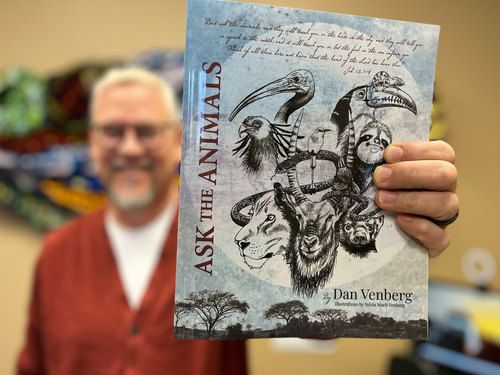The Mysterious Messiness of Multiplying New Disciples

Jesus is endowed with all the authority of heaven and earth (Matt. 28:18). And it is in and because of this authority that he calls us, commissions us—yes, commands us—his Church, to “go into all the world and make new disciples.” As such, we consider ourselves a Disciple Making Church, and we seek to multiply new disciples.
Much ink has been used in effort to define what disciple making is; to describe what disciple making looks like; to examine the nuances of the identity, role, and cross-over of both disciple and discipler; to develop “how-to” strategies to foster “disciple-making movements.”
We have our idealistic notions of what disciple making entails and what a commitment to such will result in, by the grace of God. We pray for and anticipate new and revitalized churches, new missionaries and church planters, converts and transformed lives, a new generation of leaders, healthy churches. All this is good and right. And we rest in passages like Proverbs 19:21 that assure us that even though “many are the plans in a person’s heart... it is the Lord’s purpose that prevails.”
The lessons of biblical history and present disciple-making reality teach us that disciple making can be painful and messy. It can lead to division in the Church. It can result in syncretism and heresy. Motives and agendas for making disciples can be false and selfish. Yet, what is clear from both biblical and world history is that, as Christ and his Word is proclaimed, and as disciples of Jesus are multiplied, and even in spite of the sinful state of us sinners in the mix, God is accomplishing his purpose. And in that messy and mysterious process, we can rejoice! We can be confident as we dive in and take part in it.
Consider the messiness of the conflict in Paul’s disciple-making missionary team due to the disagreement between Paul and Barnabas as to the value/quality of John Mark as a team member. The disagreement was so sharp that the team was divided. As we know, God used this for his purpose, to multiply ministry and disciples… and to unleash the gospel impact of Mark’s own ministry, as he is later sought after by Paul for his service (2 Tim. 4:11). We could look at the many flawed Bible characters whom God used for his purpose: the vengeful Moses, the deceiving Jacob, the young bragging Joseph, the reluctant Jonah, the jealous David, the brash and Jesus-denying Peter, and on and on. But God used them all to powerful gospel effect!
Consider the example of a young man in our Chad mission field (let’s call him Moses). He has grown up as a Muslim. He has grown up with an understanding that his only hope for attaining paradise come judgment day is if he can earn enough merit with Allah through performance and obedience to the law of Islam. And even then, he can never have any assurance because of the capricious character of the god of Islam. And now, through the friendship and discipling of an LBIM missionary family, he has been hearing the gospel. He is expressing his belief in this truth; he is eager to learn more; God is creating faith in his heart… and he has been beaten by his father because of it. Moses is confronted with a messy situation. Should he run away from home? If he leaves, how can he continue learning what he has come to believe as true? Will he continue to suffer beatings, or worse, if he stays? How will this impact the relationship between the missionary and the community in which they live? Tough questions. But we rest in God’s sovereignty, and trust that this young man, Lord willing, will be unleashed and used for God’s purpose, in God’s time.
Consider the example of a middle-aged man that I met in Japan recently (let’s call him John). He is Buddhist by tradition, and from a moral perspective, mostly concerned about leading a good life and honoring both his ancestors and the humanity around him. He has been growing in a relationship with one of our missionaries, and, due to a shared passion for music, has been coming to church, helping with music ministry… and listening to the Word of God. The Bible tells us that faith comes through hearing the Word (Rom. 10:17). John is hearing. This is a part of disciple making.
Consider another man that I know from Chad (let’s call him Peter). He used to take great delight in debating with me, trying to convince me to become a Muslim. We spent countless hours in debate, comparing the Word of God and the Qur’an. One day, when I was verbally attacked for being a Christian by a visiting extremist Islam Imam, Peter stood up and defended me, articulating the gospel to the crowd much more clearly than I ever could have. What does that even mean, that a Muslim preaches the gospel? We can rest in the words of Paul, who wrote in Philippians 1:18, “But what does it matter? The important thing is that in every way, whether from false motives or true, Christ is preached.” Since that time, Peter has secretly confessed faith, but remains “underground,” living in his Muslim community, afraid to be baptized. It’s messy. It’s not clean cut. But God’s purpose prevails. And new leaders are unleashed, and disciples are multiplied.
We don’t have to have it all figured out in advance before we act out what it means to be a Disciple-Making Church. God has called and continues to call people of all kinds to make disciples. Some are young. Some are old. Some are expected. Many are not. Some are seemingly prepared. Most are not. Some have a strong faith and firm conviction of call. Many are wrestling with their unbelief, and can’t imagine how God could possibly use them. But he does, sometimes in ways that we would not believe even if we were told. But the beautiful thing is that this is God’s mission. And he commands us to join him. It can be scary, and baffling, and mysterious. But he promises to be with us. And he promises that his purpose and mission will be accomplished in and through us. So let’s go!
Dan Venberg serves the Church of the Lutheran Brethren as its Director of International Mission.
Much ink has been used in effort to define what disciple making is; to describe what disciple making looks like; to examine the nuances of the identity, role, and cross-over of both disciple and discipler; to develop “how-to” strategies to foster “disciple-making movements.”
We have our idealistic notions of what disciple making entails and what a commitment to such will result in, by the grace of God. We pray for and anticipate new and revitalized churches, new missionaries and church planters, converts and transformed lives, a new generation of leaders, healthy churches. All this is good and right. And we rest in passages like Proverbs 19:21 that assure us that even though “many are the plans in a person’s heart... it is the Lord’s purpose that prevails.”
The lessons of biblical history and present disciple-making reality teach us that disciple making can be painful and messy. It can lead to division in the Church. It can result in syncretism and heresy. Motives and agendas for making disciples can be false and selfish. Yet, what is clear from both biblical and world history is that, as Christ and his Word is proclaimed, and as disciples of Jesus are multiplied, and even in spite of the sinful state of us sinners in the mix, God is accomplishing his purpose. And in that messy and mysterious process, we can rejoice! We can be confident as we dive in and take part in it.
Consider the messiness of the conflict in Paul’s disciple-making missionary team due to the disagreement between Paul and Barnabas as to the value/quality of John Mark as a team member. The disagreement was so sharp that the team was divided. As we know, God used this for his purpose, to multiply ministry and disciples… and to unleash the gospel impact of Mark’s own ministry, as he is later sought after by Paul for his service (2 Tim. 4:11). We could look at the many flawed Bible characters whom God used for his purpose: the vengeful Moses, the deceiving Jacob, the young bragging Joseph, the reluctant Jonah, the jealous David, the brash and Jesus-denying Peter, and on and on. But God used them all to powerful gospel effect!
Consider the example of a young man in our Chad mission field (let’s call him Moses). He has grown up as a Muslim. He has grown up with an understanding that his only hope for attaining paradise come judgment day is if he can earn enough merit with Allah through performance and obedience to the law of Islam. And even then, he can never have any assurance because of the capricious character of the god of Islam. And now, through the friendship and discipling of an LBIM missionary family, he has been hearing the gospel. He is expressing his belief in this truth; he is eager to learn more; God is creating faith in his heart… and he has been beaten by his father because of it. Moses is confronted with a messy situation. Should he run away from home? If he leaves, how can he continue learning what he has come to believe as true? Will he continue to suffer beatings, or worse, if he stays? How will this impact the relationship between the missionary and the community in which they live? Tough questions. But we rest in God’s sovereignty, and trust that this young man, Lord willing, will be unleashed and used for God’s purpose, in God’s time.
Consider the example of a middle-aged man that I met in Japan recently (let’s call him John). He is Buddhist by tradition, and from a moral perspective, mostly concerned about leading a good life and honoring both his ancestors and the humanity around him. He has been growing in a relationship with one of our missionaries, and, due to a shared passion for music, has been coming to church, helping with music ministry… and listening to the Word of God. The Bible tells us that faith comes through hearing the Word (Rom. 10:17). John is hearing. This is a part of disciple making.
Consider another man that I know from Chad (let’s call him Peter). He used to take great delight in debating with me, trying to convince me to become a Muslim. We spent countless hours in debate, comparing the Word of God and the Qur’an. One day, when I was verbally attacked for being a Christian by a visiting extremist Islam Imam, Peter stood up and defended me, articulating the gospel to the crowd much more clearly than I ever could have. What does that even mean, that a Muslim preaches the gospel? We can rest in the words of Paul, who wrote in Philippians 1:18, “But what does it matter? The important thing is that in every way, whether from false motives or true, Christ is preached.” Since that time, Peter has secretly confessed faith, but remains “underground,” living in his Muslim community, afraid to be baptized. It’s messy. It’s not clean cut. But God’s purpose prevails. And new leaders are unleashed, and disciples are multiplied.
We don’t have to have it all figured out in advance before we act out what it means to be a Disciple-Making Church. God has called and continues to call people of all kinds to make disciples. Some are young. Some are old. Some are expected. Many are not. Some are seemingly prepared. Most are not. Some have a strong faith and firm conviction of call. Many are wrestling with their unbelief, and can’t imagine how God could possibly use them. But he does, sometimes in ways that we would not believe even if we were told. But the beautiful thing is that this is God’s mission. And he commands us to join him. It can be scary, and baffling, and mysterious. But he promises to be with us. And he promises that his purpose and mission will be accomplished in and through us. So let’s go!
Dan Venberg serves the Church of the Lutheran Brethren as its Director of International Mission.


When Job and his friends discussed the age-old question, “Why does a good God allow evil?” God responded by saying, “[A]sk the animals, and they will teach you...” (Job 12:7). Dan Venberg has written thirty one devotions, exploring God’s creative power demonstrated through the animals.
PRICE: $17.99
PRICE: $17.99
Posted in Faith and Fellowship Magazine, International Mission
Posted in 2023-02, Dan Venberg, Disciple-Making Church, Discipleship
Posted in 2023-02, Dan Venberg, Disciple-Making Church, Discipleship
